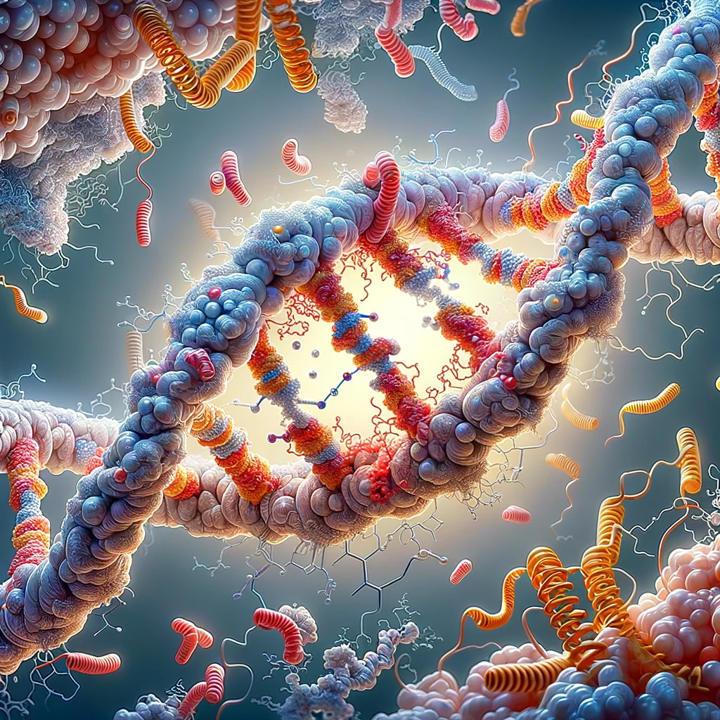

We invite you to join us online on Thursday 7th March, from 3:00 PM to 4:00 PM
In this webinar series, presented by the Cancer Research UK Convergence Science Centre at Imperial College London and The Institute of Cancer Research, London, researchers from both institutions will discuss key challenges facing cancer research and the potential of convergence science to tackle them. Join us to discover how innovative approaches and cutting-edge technologies can elucidate unresolved questions in cancer biology, revolutionise cancer research, and bring pioneering treatments to cancer patients faster.
Hosted by our Scientific Director, Professor Axel Behrens, this series aims to fulfil the Centre's mission of fostering collaboration between traditionally separate disciplines.
We invite you to join us online on Thursday, March 7th, from 3:00 PM to 4:00 PM, for a presentation by:
Dr Gideon Coster – Division of Cancer Biology, The Institute of Cancer Research
"When DNA becomes its own enemy: The mechanism of DNA-induced replication stalling"
The machinery responsible for duplicating our genome, the replisome, must contend with various challenges and obstacles, such as DNA damage and DNA-bound proteins. Genetic evidence suggests that certain DNA sequences, even when undamaged, can impede replication. However, the evidence is indirect and often conflicting.
By reconstituting DNA replication in vitro, we discovered that certain structure-prone sequences are sufficient to stall replication. We dissected the mechanism to reveal that replication recovery modes vary with the type of DNA secondary structure. Our work highlights the DNA itself as an endogenous source of replication stress, which is a hallmark of cancer cells, and may affect the way we use DNA replication and checkpoint inhibitors in the clinic.
Gideon obtained his B.Sc. in Life Sciences and Ph.D in Genetics from the Hebrew University of Jerusalem in Israel. In 2011 he joined the lab of Dr. John Diffley for his postdoctoral work at the London Research Institute, which later became part of the Francis Crick Institute. In 2018 he established his lab at the Chelsea site of the ICR, funded by a Sir Henry Dale Fellowship from the Wellcome Trust and Royal Society.
&
Professor David Rueda – MRC LMS, Imperial College London
“FANCD2-FANCI is a sliding clamp that surveys DNA and recognizes single-stranded gaps”
DNA crosslinks block DNA replication and are repaired by the Fanconi Anemia pathway. The FANCD2-FANCI (D2-I) protein complex is central to this process as it initiates repair by coordinating DNA incisions around the lesion1. However, D2-I is also known to play a more general role in DNA repair and in protecting stalled replication forks from unscheduled degradation2-4. It is currently unclear how DNA crosslinks are recognized and how D2-I functions in replication fork protection. Using single-molecule microscopy, we show that D2-I is a sliding clamp that binds to and diffuses on double-stranded DNA. Strikingly, sliding D2-I stalls upon encountering single-stranded–double-stranded (ss-ds) DNA junctions- structures that are generated when replication forks stall at DNA lesions5. Using cryoEM, we determined structures of D2-I on DNA which show that stalled D2-I makes specific interactions with the ss-dsDNA junction that are distinct from those made by sliding D2-I. We propose that D2-I surveys DNA and, rather than recognizing DNA crosslinks directly, it specifically clamps onto ss-dsDNA junctions. Since ss-dsDNA junctions are found at stalled replication forks, D2-I can identify sites of DNA damage. Therefore, our data provide a unified molecular mechanism that reconciles the roles of D2-I in the recognition and protection of stalled replication forks in multiple DNA repair pathways.
Professor David Rueda is a Spanish Biophysical Chemist who received his DSc from the École Polytechnique Fédérale de Lausanne (Switzerland), where he studied Chemical Engineering. During his doctoral thesis, he obtained training in Laser Spectroscopy and Quantum Chemistry. Prof Rueda then moved to the University of Michigan, where he developed novel fluorescence microscopy approaches to study the dynamics of small catalytic RNA enzymes at the single-molecule level. He received a Postdoc. Mobility Fellowship from the Swiss NSF. Dr Rueda joined the Department of Chemistry at Wayne State University (Michigan), where he expanded his Single Molecule Biophysics work to investigate large RNA enzymes, RNA helicases, DNA polymerases and DNA deaminases. During this period, he obtained funding from the NIH and a prestigious CAREER award from the NSF. He also received numerous awards, including an Excellence in Teaching Award and the Outstanding Junior Faculty Award. He was also an A. Paul Schaap Faculty Scholar. He moved to Imperial College London and the MRC-LMS in 2012, where he holds the Chair in Molecular and Cellular Biophysics and leads the Single Molecule Imaging group. He continues to develop and apply single-molecule microscopy-based approaches to elucidate the molecular mechanism of several cellular processes involved in human diseases, such as cancer and neurodegenerative disorders.
Please note: This webinar is exclusively available to colleagues from the Institute of Cancer Research, the Royal Marsden, Imperial and Imperial College Healthcare. Do not forward to colleagues outside of these organisations.